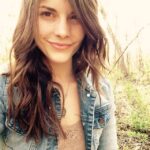 Sara Hailstone, Managing Editor
Sara Hailstone, Managing Editor
Sara Hailstone’s writing is born from navigating the raw and confronting connections that living in rurality projects by scouring domestic landscapes. She is an educator and writer from Madoc, Ontario who orients towards the ferocity and serenity of nature and what we can learn as humans from the face of forest in our own lives. A graduate of Guelph University (B.A.) and Queen’s University (M.A. and B.Ed.), she has also finished her Masters in English in Public Texts at Trent University which has set her along a path of passion of literature.
Sara has had poetry, short stories and essays published in various publications. She is now working on her debut novel with Running Wild & RIZE Press. Sara has grown up immersed in the tones of Canlit, her navigation of the Great Lakes brushstroked by writers like Jane Urquhart and her novel The Underpainter of frozen snowdrifts and expanses of water horizons. She has been inspired by conversations around Survival and the imagination of a Canadian Shield crowning the lakes like a sleeping lizard and terrain that early settlement braced against and ancient societal formations thrived upon. The waterways as a portal to sacred movement, remembered with petroglyph, Sara looks forward to expanding her literary impression of the Great Lakes more south and in textual consciousness unknown.
Sara can be found on her website, Instagram, and X.
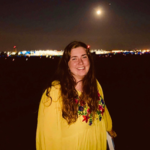 Margie Griffin, Fiction Editor
Margie Griffin, Fiction Editor
Margie Griffin’s ever-evolving goal in life is to live on a sailboat and travel the world by sea. Until then, she is limited to living out her dreams through reading. Because of this, she wants to read new and exciting stories from authors who challenge their characters to do the unexpected. She wants to see polished and well-thought-out pieces with character-driven plots and distinct voices from authors of varying backgrounds. Whether you write stories like Ruth Ware’s thrilling page-turners or characters like Angie Thomas’ and Margaret Atwood’s world-changers, Margie wants to read them. Learn more about Margie.
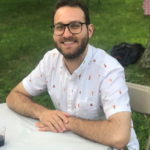 Will Russo, Poetry Editor
Will Russo, Poetry Editor
Will is most interested in work that demonstrates an astute sense of control. No matter the subject, a poem should guide the reader with careful diction and formal choices, such that the poem transcends mere description and is couched in the voice and perspective of the speaker. A few short favorites Will’s: “White Dog” by Carl Phillips, “Elms” by Louise Glück, “To the Harbormaster” by Frank O’Hara.
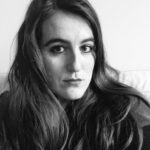 Brittany N. Jaekel, Nonfiction Editor
Brittany N. Jaekel, Nonfiction Editor
Brittany N. Jaekel writes from her home in the Twin Cities. She is particularly drawn to cross-genre experiments, memoir that plays with form and language (think Good Woman: Poems and a Memoir by Lucille Clifton), and stories of “human and natural histories” (think Judith Schalansky’s [Pocket] Atlas of Remote Islands or John McPhee’s Annals of the Former World). Send creative nonfiction that engages the reader long after the work has been set down, and/or writing that boldly experiments with language or genre while telling a compelling story. Brittany’s work has appeared in RHINO, The Journal of the Acoustical Society of America, and elsewhere.
Learn more about Brittany on her website.
 Heather Sutherin, Reviews Editor
Heather Sutherin, Reviews Editor
Heather Sutherin (they/them) is an emerging fiction author and playwright from Youngstown, Ohio. Having earned a BA in English from Kent State University and an MFA in Creative Writing from Youngstown State University via the Northeast Ohio Master of Fine Arts Program (NEOMFA), Heather is happy to call northeast Ohio home.
Through writing, Heather loves to explore themes of romance, love, familial ties, evangelism and theology, horror, and mental health (sometimes all at once!). By using these themes, they hope to reveal layers of both corruption and purity hidden within systems both real and fictitious.
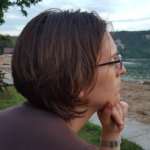 Emily Updegraff, Reviews Editor
Emily Updegraff, Reviews Editor
Born and raised in the western U.S., Emily has lived in the Chicago area for over twenty years and now calls it home. As a reader of fiction, she loves books that open windows into the inner lives of others, think works by Alice Munro, Jhumpa Lahiri, Kazuo Ishiguro, and Wallace Stegner. Family dramas like the Gilead series by Marilynne Robinson are also favorites. As a reader of poetry, she is drawn to work that resonates–both sonically through the music of spoken word, and through likenesses to common human experiences. She particularly admires Ada Limón, Wisława Szymborska, Lucille Clifton, Stephen Dunn, Mary Oliver, and Gerard Manley Hopkins. As a poet, her work has appeared in Great Lakes Review, River and South Review, Third Wednesday, and elsewhere.
 Monique Attrux, Reviews Editor
Monique Attrux, Reviews Editor
After spending two decades in Hong Kong where she was born and raised, Monique took her passion for literature with her to Toronto, where she became a PhD candidate at York University. She is deeply passionate about exploring how language shapes and reflects ethnic identities in the realm of literature. Her academic journey has been enriched by the generous support of several scholarships: York Entrance Scholarship (2020), the Vivienne Poy Hakka Research Award (2020), the Ontario Graduate Scholarship (2021), the SSHRC Joseph-Armand Bombardier Canadian Graduate Scholarship (2022), the Canada-China Initiatives Fund (2022), and the Clara Thomas Scholarship in Canadian Studies (2023). She is shaped by Evelyn Lau, Roxane Gay, George Orwell, bell hooks, and Audre Lorde. Although she has a bias for clean prose, her reading tastes are eclectic, and she has yet to claim a favourite author. In time, she hopes to dabble in some creative writing of her own, but for now, she will enjoy the sweet escapes of getting lost in other people’s wor(l)ds.
 Olga Stein, Reviews Editor
Olga Stein, Reviews Editor
Olga Stein earned a PhD in English from York University, and is a university and college instructor. Stein teaches courses in communications, humanities and social sciences at Centennial College and York U. She has also taught writing, modern and contemporary Canadian and American literature, and a gender studies course called “Love: Historical and Philosophical Perspectives.”
Stein’s research and writing focuses on the sociology of literature, popular culture, and cultural institutions. As chief editor of the literary review magazine, Books in Canada, she contributed more than 150 book reviews and essays, 60 editorials, and numerous interviews. For the past three years she has been the non-fiction editor for WordCity Literary Journal, a multi-genre, global online literary journal to which Stein contributes critical essays, editorials, interviews, and poems. She hopes to publish her collection of essays as Reflections on the (Re)Current Moment. Stein was shortlisted for the 2023 annual Fence Magazine short fiction competition. She recently also completed her first collection of poetry, Love Songs: Prayers to gods, not men. Her poetry has appeared in WordCity, Atunispoety.com, and several international poetry anthologies.
 Gillian DiPofi, Photography Editor
Gillian DiPofi, Photography Editor
Gillian DiPofi is an artist from Geneva on the Lake, Ohio. Her preferred mediums are watercolor and photography. She is in search of photographs that relate the photographer’s intention without the use of repetitive form or subject matter. She enjoys photography that provokes feelings of nostalgia and familiarity. She is a big fan of Street Photography because of the small, fleeting moments it captures of people’s everyday lives. In her own work, she tends to paint or shoot “What feels right to me in that moment.”
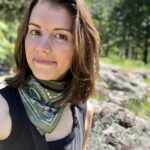 Aurora Blanchard, Review Editor, Non-Fiction
Aurora Blanchard, Review Editor, Non-Fiction
Aurora is interested in reading regional memoir, creative nonfiction, and lyrical essays from diverse voices where the setting is its own character. She would love to see more Narrative Map submissions. As a Midwesterner, she can appreciate the clash between urban and rural settings and the need to conform versus the need to be an individual. With a background in journalism, she admires Joan Didion who can flesh out all sides of a story without heavy-handed preaching. Also, serious truths can be balanced with humor and whimsy. When Aurora is not hiking, she writes for food and outdoor magazines. Her previous work has appeared in The Arkansas Review.
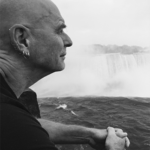 Michael Billings, Review Editor, Fiction
Michael Billings, Review Editor, Fiction
I don’t necessarily fancy myself a formalist or classist; call me a generalist, if you must. In my own work, I tend to explore narrative possibilities or impossibilities; in short, I wrestle with improbabilities straying from the perceived path failing to latch onto the welcome wagon. I drift toward multimedia these days but still love the written text. All that being said, I find myself drawn to works that expand conventions, literature that takes one outside of comfort zones and challenges perceptions. I am enthralled with Murakami and his Kafkaesque adventures. The absurdist realms of John Kennedy Toole, Laurie Foos and David Bowman, along with Beckettian banality, are familiar playgrounds. Investigating the barren landscapes of brutal prose from Anchee Min, J.M. Coetzee and Han Kang offer sobering perspectives on depravity. Shifting focus, the wordplay of Joyce and the jazzy riffs of Kerouac soothe the aural senses. Delving further into wordplay and speaking in two tongues, the work of Theresa Hak Kyung Cha explores marginality and displacement. Finally, it is refreshing to settle in with the calming straightforward narratives of David Hinton.
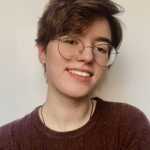 Elizabeth Katavich, Review Editor, Fiction
Elizabeth Katavich, Review Editor, Fiction
Elizabeth Katavich commends writing with great heart and personality, showcasing a strong sense of voice and individual identity. Her favorite works include “A Dam Is a Promise” by Michael Salisbury and “Detroit” by Craig Bernier. She herself is a seasoned fiction writer and author of several works of her own, resulting in her earning a Certificate for Superior Writing in 2017. Having found a passion for English literature and composition, she currently attends Lakeland Community College with a focus in journalism.
 AJ Schmitz, Review Editor, Poetry
AJ Schmitz, Review Editor, Poetry
AJ Schmitz NEEDS poetry to push against constraints. It needs to explore the gray-matter, to manipulate language, manipulate the boundaries of the genre. There is a Psychogeographical element that all poetry needs, pushing against convention, working within its parameters while simultaneously reshaping the lay of the land. Take academic prose and put its back on the canvas like he does in his poem LA Story; Or Songs On My Ipod; mess with structural mores as Frank O’Hara does in his “Meditations In An Emergency”; or focus on Place the way Langston Hughes does in “Juke Box Love Song”. Let the words ululate, defamiliarize, pioneer the blank spaces of creativity. Use language to SHOW, not tell; narrative poems are tremendous, but be sure the work speaks in multiple levels, in multiple voices, to multiple audiences. Poetry need not be Experimental, but it MUST be Exploratory.
Poetry needs more Tom Waits and less Tom Gray.
For more on his Aesthetics and Attitudes, follow AJ on Twitter.
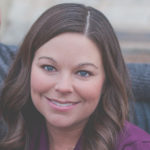 Kate Watt, Review Editor, Poetry
Kate Watt, Review Editor, Poetry
Poetry that turns Kate on could be described in traditional terms as poetry that is playful with patterns, has fresh energy and imagery, tension within the form and the content, acute attention to the line, and that offers organic insight born out of the poem’s curiosities. But really, what it all boils down to is voice. The poems she responds to are those that have discernible attitude and urgency about them; those that aren’t afraid to piss her off and hold her accountable in their truth. It boils down to voices that take risks and unnerve. Voices that haunt, both on the page and long after the pages fall silent. Check out Franny Choi’s latest book, Floating, Brilliant, Gone, to enjoy such a voice. Learn more about Kate.
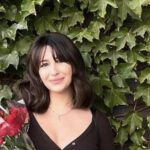 Olivia De Sanctis, Review Editor, Poetry
Olivia De Sanctis, Review Editor, Poetry
Olivia was born and raised in the Greater Toronto Area and continues to reside within the city, which she holds dear to her. Her love of both reading and writing poetry has led her to study the subject at York University, where she is now pursuing a Ph.D. in English with a focus on modern and contemporary experimental poetry. Her research particularly focuses on the intersections between poetry and the visual arts, multimedia literature, and North American poetry.
Olivia is particularly drawn to works that use form to push through the limitations of language. Poetry which collages the language and diction of opposing fields, retrieves lost voices from within pre-existing texts, or takes an exploratory approach to their use of language are of great interest. She is intrigued by poetry that mediates bodily experience and human interaction with the physical realm, whether through content or form. Some of the poets who have shaped her include Allan Ginsberg, Emily Dickinson, Gertrude Stein and Mina Loy whose description of American poetry as a “composite language [which] is a very living language, it grows as you speak” demonstrates Olivia’s view of Great Lake Region poetics.
Read a selection of Oliva’s poems here.
 Kelsey Askwith, Copy Editor
Kelsey Askwith, Copy Editor
Kelsey Askwith is a fiction writer with short stories published in several literary journals. She is currently working on completing her first short story collection. An avid reader, her dream job is to be paid to read amazing fiction and nonfiction, preferably by a pool, but a sunny patch on the porch will do in a pinch. She lives on a small farm where she tends a large garden, chickens, rabbits, and cats. She is also busy raising her four children whom she adores.
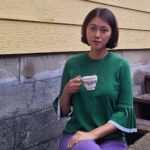 Sarah(Qiuqi) Bovold, Social Media Coordinator
Sarah(Qiuqi) Bovold, Social Media Coordinator
Born and raised in Beijing, China, Sarah moved to the U.S. in 2016 for college. In January 2018, Sarah took her first ever creative writing class-Creative Nonfiction Workshop, since then she has been doing the thing that might be called [writing]. Her essays have been published in Drunk Monkeys, Rabid Oak, Thimble Literary Magazine, and elsewhere. After spending quite a bit of money on a U-Haul and moving boxes, Sarah calls Minnesota home now. Besides writing, Sarah loves traveling, reading, and drinking coffee. In 2022, she took Empire Builder, an Amtrak train from Chicago to Seattle. It was a very exciting experience, however, 46 hours of sitting in a small seat wasn’t very pleasant. As a reader, Jenny Boully, Peter Orner, and Brenda Miller are the writers she admires a lot.
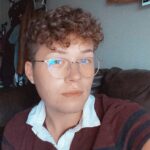 Bradley Pavey, Website Coordinator
Bradley Pavey, Website Coordinator
Bradley has loved reading since he was very young when he and his mother would take turns reading books to each other, and he began writing when he was 6 years old, jotting stories and poems in notebooks. He enjoys works that are character-driven, highlighting characters and shared experiences that have the power to transport the reader into new perspectives and encounters with fresh ideas. He believes that, in this facet, written language is one of the best ways to foster community and growth by transferring knowledge and understanding that can come alive in different ways to each reader.
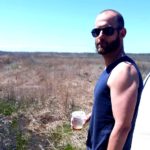 Mitch James, Editor-at-Large
Mitch James, Editor-at-Large
Mitch likes big ideas, believable characters, and lucid prose. He’s moved by points of contact, places where characters and their lives come together with each other or the world and systems around them. He finds tremendous meaning in the scraps left in the wake of living. Some of the best novels Mitch has read in the past year are Hilary Plum’s Strawberry Fields, Robert Olmstead’s Coal Black Horse trilogy, Wiley Cash’s The Last Ballad, Abi Andrew’s The Word for Woman is Wilderness, Sarah Rose Etter’s Book of X, Catherine Lacey’s Pew, and Evie Wyld’s Bass Rock. Some favorite short story collections include Michael Croley’s Any Other Place: Stories and Jamie Lyn Smith’s Township, and favorite poetry collections include Ron Riekki and Andrea Scarpino’s Undocumented: Great Lakes Poets Laureate on Social Justice, Lauren Shapiro’s Arena, Zach Savich’s Century Swept Brutal, James Richardson’s for Now, and Kari Gunter-Seymour’s A Place So Deep inside American It Can’t Be Seen. Some memorable non-fiction reads this year include David Christian’s Maps of Time, John McWhorter’s Our Magnificent Bastard Tongue, Matthew Salesses’ Craft in the Real World, and Eric Bennett’s Workshops of Empire.
In short, though Mitch prefers his steak medium rare, he likes his writing well-done.
Find more of Mitch’s work on his website.